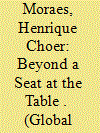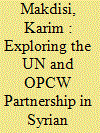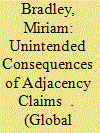| Srl | Item |
| 1 |
ID:
170310


|
|
|
|
|
| Summary/Abstract |
Debates on the legitimacy of global governance pay remarkably little attention to whether and how developing countries can influence global governance. Instead, the focus lies significantly on addressing legitimacy challenges such as access and exclusion in global governance. Despite their merits, these debates often stop short of addressing a crucial question: How can weak states harness increased participation in global governance if they are ill-equipped to do so? To respond to this question, this article lays down a framework of mechanisms that might induce more influence by developing countries. The article makes two claims. First, we should understand influence as the combination of two skills: translation of global governance and empowerment to defend the interests of a country at global decision-making processes. Second, increased influence by developing countries must be stimulated by leveraging both domestic capacities (actor-level mechanisms of influence) and resources available at the international system (system-level mechanisms).
|
|
|
|
|
|
|
|
|
|
|
|
|
|
|
|
| 2 |
ID:
170309


|
|
|
|
|
| Summary/Abstract |
After reviewing recent literature on international organizations’ autonomy and cooperation, this article explores the unprecedented partnership between the Organization for the Prohibition of Chemical Weapons—implementing body for the Chemical Weapons Convention—and the UN Secretariat during the 2013–2014 chemical weapons disarmament in Syria. The article explores how this collaboration, embodied on the ground through the creation of a Joint Mission, evolved from hesitant, bureaucratic rivalry to an increasingly intense relationship in the aftermath of a large-scale attack near Damascus in August 2013. The research is based on wide-ranging interviews with senior OPCW and UN staff, and relevant state officials. The article shows how international shocks, high-level support from key Member States, and leadership at the Secretariat level produced requisite intra- and interorganizational consensus to mitigate turf wars. Relative autonomy of mission staff and bureaucratic flexibility further allowed skilled boundary spanners to build trust and increase the mission’s leeway, allowing it to navigate complex political challenges.
|
|
|
|
|
|
|
|
|
|
|
|
|
|
|
|
| 3 |
ID:
170308


|
|
|
|
|
| Summary/Abstract |
A fundamental question facing global governance today is whether the UN peacekeeping regime can function with enough skilled troops to execute increasingly demanding and complicated mandates. The People’s Republic of China is informally thought of as a potential lead troop-contributing country. China typically deploys non-combat enabler troops, and recently began deploying combat troops, which may have to engage in live fire to defend the mandate. The risks and costs associated with dispatching combat troops challenge the benefits that China derives from supporting peacekeeping. I first establish China’s feedback mechanisms to facilitate simple and complex learning against China’s peacekeeping trajectory and motivations for participation. I then address the implications of China’s combat troop deployment, focusing on the UN Multidimensional Stabilization Mission in Mali and the UN Mission in South Sudan. The article draws insights from interviews with Chinese foreign policy elites and UN officials, and participant observation at the UN Department of Peacekeeping Operations.
|
|
|
|
|
|
|
|
|
|
|
|
|
|
|
|
| 4 |
ID:
170313


|
|
|
|
|
| Summary/Abstract |
Regime complex has been widely recognized in many governance issues, but the evolutionary dynamics in regime complex are largely overlooked. This article explores the evolutionary dynamics by conducting a case study on the regime complex for human genetic data, which has evolved as an alternation between stable and unstable periods, known as punctuated equilibrium. Given that existing theories fail to explain the evolutionary pattern, a multiactor analysis framework is set up with the core argument that the evolution of regime complex is shaped by interactions between governance issues outside the regime complex, and a combination of actor power and institutional logics within them. Besides its specific contribution to the literature on regime complex, this article has general implications for research in global governance.
|
|
|
|
|
|
|
|
|
|
|
|
|
|
|
|
| 5 |
ID:
170312


|
|
|
|
|
| Summary/Abstract |
This article examines the role of adjacency claims in the development of a norm for the international protection of internally displaced persons (IDP s). Consistent with existing scholarship on adjacency claims, the construction of analogies between refugee protection and IDP protection was instrumental in garnering broad international acceptance of the IDP protection norm. However, these same analogies had an impact beyond the abstract acceptance of the norm. They were used to justify the expansion of the mandate of the UN Refugee Agency (UNHCR) to encompass IDP s, and they shaped the way UNHCR understands and implements IDP protection. UNHCR replicated its policy approach from refugees to IDP s, generating a dysfunctional approach to IDP protection. Therefore, adjacency claims can have an effect beyond garnering support for new norms, and may result in suboptimal governance arrangements for implementing those norms.
|
|
|
|
|
|
|
|
|
|
|
|
|
|
|
|
| 6 |
ID:
170307


|
|
|
|
|
| Summary/Abstract |
International politics has a bigger impact on the United Nations than vice versa, even if sometimes a Secretary-General, agency head, or field mission can influence independently the world beyond meeting rooms. This reality is essential: to understand the UN is to understand comparative state foreign policies.
|
|
|
|
|
|
|
|
|
|
|
|
|
|
|
|
| 7 |
ID:
170311


|
|
|
|
|
| Summary/Abstract |
The global governance literature is increasingly concerned with questions regarding the purpose of global governance and the sources of power in world politics. One strand of this debate centers on nongovernmental organizations and to what extent their role in global politics and policy processes is legitimate. This article uses Greenpeace India as an instructive case study to analyze the legitimacy problems facing international nongovernmental organizations (INGO s) campaigning on a global policy platform in the context of domestic politics. The article argues that the undertheorization of INGO s’ agency as global actors is likely to reproduce processes of structural delegitimation that maintain a discrepancy between two of their legitimacy constructs. This is exemplified in questions about their representativeness and restrictive regulatory frameworks that undermine their legality. This article proposes that developing a more nuanced empirical understanding of the endogenous and exogenous limits of INGO s’ power can help bridge the theoretical gap between their global and local agencies.
|
|
|
|
|
|
|
|
|
|
|
|
|
|
|
|